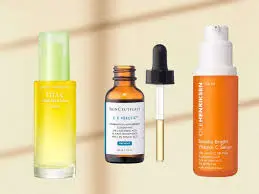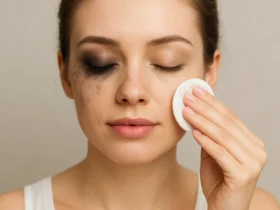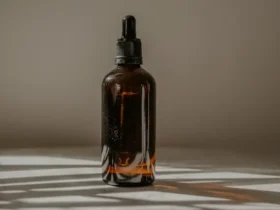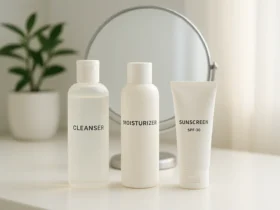Are skin serums just a skincare trend or do they actually deliver results? That’s the question on everyone’s mind when deciding whether to invest in another bottle of product that promises glowing, youthful skin.
To cut through the noise, we spoke to a board-certified dermatologist to find out the truth. Do skin serums actually work? The short answer: yes — but only when used correctly and with the right ingredients for your skin type.
Yes, skin serums can be effective, especially when they contain proven active ingredients.
Not every serum is worth your money — results depend on your skin type, routine, and consistency.
Dermatologists recommend serums with vitamin C, retinol, hyaluronic acid, and niacinamide.
Serums aren’t mandatory for everyone, but they can enhance your skincare routine significantly.
Always check for quality, concentration, and clinical evidence before buying.
What Do Skin Serums Actually Do?
Skin serums are lightweight, fast-absorbing liquids packed with concentrated active ingredients designed to address specific skin concerns — like dullness, fine lines, acne, or dehydration.
Unlike moisturizers that focus on hydration and barrier repair, serums penetrate deeper into the skin and deliver high-potency actives like vitamin C, retinol, hyaluronic acid, and peptides. This makes them a powerful addition to your skincare routine — especially when you’re targeting visible results.
But not all serums work the same. Their effectiveness depends on:
-
Ingredient quality and stability
-
Proper formulation
-
Consistent use
In short: serums are designed to go deep and work hard, but they only help if you pick the right one for your needs.
What Do Skin Serums Actually Do?
Skin serums are lightweight, fast-absorbing liquids packed with concentrated active ingredients designed to address specific skin concerns — like dullness, fine lines, acne, or dehydration.
Unlike moisturizers that focus on hydration and barrier repair, serums penetrate deeper into the skin and deliver high-potency actives like vitamin C, retinol, hyaluronic acid, and peptides. This makes them a powerful addition to your skincare routine — especially when you’re targeting visible results.
But not all serums work the same. Their effectiveness depends on:
-
Ingredient quality and stability
-
Proper formulation
-
Consistent use
In short: serums are designed to go deep and work hard, but they only help if you pick the right one for your needs.
Dermatologist Opinion on Skin Serums
To get a professional perspective, we asked Dr. Sana Malik, a board-certified dermatologist, whether skin serums actually work — or if they’re just overhyped.
“Serums are not a scam,” says Dr. Malik. “But they’re also not magic. Their effectiveness depends entirely on formulation and consistent use. I always tell my patients: don’t look for miracles — look for ingredients backed by science.”
So, what do dermatologists really think?
Most skincare professionals agree:
-
Yes, serums work, but only if they’re properly formulated.
-
They should contain active ingredients like vitamin C, retinol, niacinamide, or hyaluronic acid.
-
The delivery system (water-based vs oil-based) matters for how deeply the serum penetrates.
-
Not every skin type needs a serum — but for targeted treatment, they’re highly effective.
Dermatologists often recommend serums as a second step after cleansing and before moisturizing — especially for those targeting:
-
Hyperpigmentation
-
Fine lines and wrinkles
-
Dehydration
-
Acne or uneven skin tone
The takeaway? Serums are worth it if you pick the right one and stick with it.
Do Serums Really Help Your Skin?
The short answer: Yes — but only if they match your skin needs and are used consistently.
Serums can visibly improve skin health by delivering targeted active ingredients deep into the skin. Whether you’re fighting dullness, dryness, fine lines, or breakouts, a well-formulated serum can make a noticeable difference.
Here’s how serums help your skin:
-
Hydration Boost: Serums with hyaluronic acid can plump the skin within days by attracting and retaining moisture.
-
Brighter Complexion: Vitamin C serums are known to fade dark spots, fight free radicals, and brighten skin over 4–6 weeks.
-
Smoother Texture: Retinol and peptides can stimulate collagen, soften wrinkles, and refine pores — but require patience and SPF.
-
Soothing & Repair: Niacinamide reduces redness, improves barrier function, and evens out tone with minimal irritation.
What does the science say?
Studies show that regular use of high-quality serums:
-
Improves hydration by up to 70% within 2 weeks
-
Reduces fine lines by 20–30% over 12 weeks
-
Fades hyperpigmentation with consistent use over 4–8 weeks
Important: Results vary based on skin type, product strength, and routine consistency.
How Long Does It Take for a Serum to Work?
One of the most common questions people ask is:
“How soon will I see results after using a serum?”
The truth is, it depends on the type of serum, the ingredients, and how consistently you use it.
Typical Timeframes Based on Serum Type
| Serum Type | Key Ingredient | Visible Results |
|---|---|---|
| Hydrating Serum | Hyaluronic Acid | 1–3 days (plumper skin) |
| Brightening Serum | Vitamin C, Niacinamide | 2–4 weeks (more glow, less spots) |
| Anti-Aging Serum | Retinol, Peptides | 4–12 weeks (fine lines soften) |
| Acne-Fighting Serum | Salicylic Acid, BHA | 1–3 weeks (reduced breakouts) |
Consistency = Results
“Serums aren’t magic potions — they’re like vitamins for your skin,” says Dr. Malik. “Use them daily, apply correctly, and be patient.”
Tips to Boost Results:
-
Apply to slightly damp skin for better absorption
-
Use sunscreen daily (especially with vitamin C or retinol)
-
Don’t mix too many actives — keep your routine simple
-
Give it at least 4 weeks before evaluating results
Reminder:
If you don’t see improvement after 8–12 weeks, the serum may not be the right fit — or your skin needs something different.
Do You Really Need a Serum in Your Skincare Routine?
Let’s be honest — serums aren’t cheap. So it’s fair to ask:
Do you really need a serum, or is it just an extra step?
You might need a serum if:
-
You have specific skin concerns like dullness, acne scars, wrinkles, or dryness
-
Your moisturizer alone isn’t delivering visible results
-
You want faster, more targeted results with active ingredients
-
You’re building an anti-aging or pigmentation-fighting routine
You may not need one if:
-
Your skin is healthy, balanced, and doesn’t have major concerns
-
You’re on a tight budget and already use a solid cleanser + moisturizer + SPF
-
You prefer simple routines and don’t want extra steps
Dermatologist tip:
“Think of serums like tools. If your skin has a problem to fix, you pick the right tool. But not every face needs the same tool.”
Which Serums Do Dermatologists Recommend?
Dermatologists don’t endorse trends — they recommend what’s proven to work. So, which serums are worth your attention?
Ingredients Most Dermatologists Look For:
-
Vitamin C – Brightens skin, fades dark spots, and neutralizes free radicals
-
Retinol – Boosts cell turnover, smooths fine lines, and clears pores
-
Hyaluronic Acid – Deep hydration and plumping effect
-
Niacinamide – Calms inflammation, reduces oiliness, and improves texture
-
Peptides – Support collagen production and firm the skin
Trusted Serum Recommendations:
-
Vitamin C: SkinCeuticals C E Ferulic, La Roche-Posay Vitamin C Serum
-
Retinol: CeraVe Resurfacing Retinol, The Ordinary Retinol 1%
-
Hydrating: Vichy Mineral 89, The Ordinary Hyaluronic Acid 2% + B5
-
Niacinamide: Paula’s Choice 10% Niacinamide Booster, The Inkey List
Note: Always patch test new serums, especially retinol-based ones.
Are Skin Serums a Waste of Money?
Let’s be real — some serums are overpriced hype in a bottle.
But that doesn’t mean they’re all bad. The difference lies in formulation, ingredient concentration, and your skin’s needs.
Here’s how to tell if a serum is worth it:
-
It contains clinically backed ingredients (like vitamin C, not unicorn tears)
-
The concentration is effective (e.g., 10% niacinamide, 1–2% retinol)
-
It’s from a reputable brand with transparent labeling
-
It matches your skin type and concern
Red flag: If it promises “instant results” or “miracle transformations” — skip it.
Are Serums Better Than Moisturizers?
This is a common question — and the answer isn’t either/or.
Difference Between Serum and Moisturizer:
| Serum | Moisturizer |
|---|---|
| High concentration of actives | Focuses on hydration and barrier |
| Lightweight, fast-absorbing | Thicker, creates protective layer |
| Targets specific skin concerns | Locks in moisture and ingredients |








Hello!! My name is Annabella
I love to eat, travel, and eat some more! I am married to the man of my dreams and have a beautiful little girl whose smiles can brighten anyone’s day!